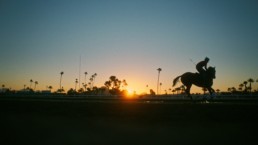‘Jockey’ Sundance Review: A Look at the Last Leg of One’s Life
This is a custom heading element.
In Jockey, riding a horse is where you’re the freest. It’s when you’re off of the horse where the real struggles come, where you must confront the larger issues in life, such as the decline of your physical health and perhaps even the shortcomings of your own life.
These are the realities that the film’s writer/director, Clint Bentley, knows well, having grown up in the world of horse racing, as a young boy, watching his father live as a jockey. It’s with this reverential love and respect for his late father’s life–a hard one–that makes his feature film debut, Jockey, such a deeply personal accomplishment.
Rather than center the film around the adrenaline-pumping moments in the saddle, Bentley focuses his directorial debut around the life of a jockey lived outside of racing–a tough one lived on the backside of the race-grounds which the career demands (think The Wrestler here). This is the life that Jackson (Clifton Collins Jr.) leads, a once-winning jockey whose prime is now behind him, who now struggles to keep up with the pack as he enters the twilight of his career. It’s when Jackson attempts to get in shape for one last championship run that he is met with new debilitations, forcing him to recognize that the demands of the job may outpace what he’s able to give.
Reflecting on one’s physical limitations is also a ripe time to come to terms one’s personal life, which is what Jockey does, and where it feels like it becomes a second film–that of a father/son movie. When rookie Gabriel (Moises Arias) arrives and approaches Jackson–bearing a striking physical resemblance to him–the two begin to foster a bond, in which Jackson begins mentoring him while he attempts to make his own final training run.
The connection created by Clifton Collins Jr. and Moises Arias here is sincere, and Clint Bentley captures it with tenderness. Family is a central theme to Jockey, that of the one we are given and the one that we make. In another noteworthy recognition to the film, Molly Parker also joins the story as Ruth, Jackson’s horse trainer, providing another layer of makeshift family dynamic.
A decision that Clint Bentley makes that gives Jockey its heartfelt effect is by blending the actors into a very raw environment in which they act opposite non-actors–real jockeys who share their life’s stories, adding incredbile realism to this world (Chloé Zhao’s The Rider comes to mind here). Scenes of debilitated jockeys sharing their stories in support group settings offer a continuous discovery, more than a pre-written script could. And moments like these–which Jockey has throughout–allows you to buy into this world so totally and completely.
Of final note here, is that the overall beauty that Clint Bentley captures gives the film the cinematic touch that it needs to transcend. While the life of a jockey, lived in a trailer is totally unglamorous, stunning camerawork by Adolpho Veloso captures beautiful moments of early sunrises and dusk sunsets in brilliant pink and blue golden hour hues. And when the film does see its jockeys racing, the ethereal music composed by The National’s Dessner Brothers takes on a heavenly, spiritual nirvana–a moment when everything else falls away.
If you’re looking for a meditative film about mortality and entering the twilight of one’s life, as well as if you want to see a more intimate look at the world of horse racing, then Jockey is for you. The film makes one of its deepest statements when Ruth offers Jackson the sage advice that “You have to tell a horse when it’s time to quit.” And although that day in which we’ll inevitably have to quit comes for all of us, Jockey shows that an indomitable spirit never will.
Ryan Rojas
Ryan is the editorial manager of Cinemacy, which he co-runs with his older sister, Morgan. Ryan is a member of the Hollywood Critics Association. Ryan's favorite films include 2001: A Space Odyssey, The Social Network, and The Master.

